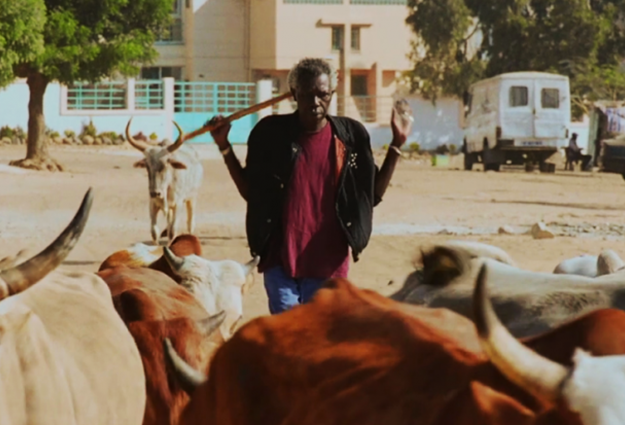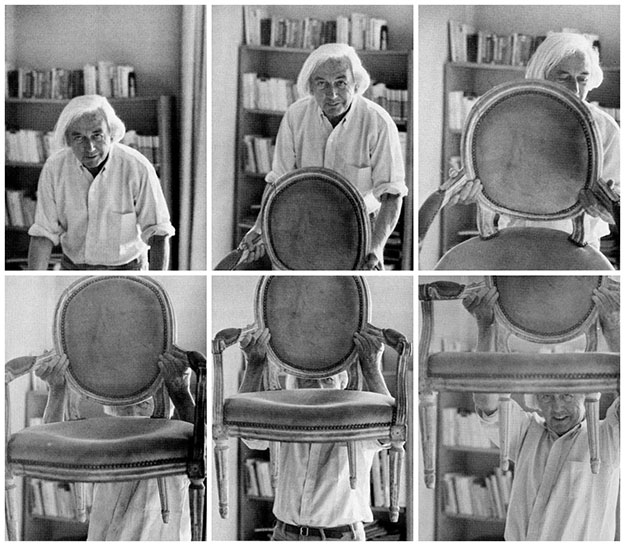News to Me: Corneliu Porumboiu, Kristen Stewart, Abderrahmane Sissako
Corneliu Porumboiu’s Gomera
Infinite Football
Three months after Corneliu Porumboiu premiered Infinite Football at the 2018 Berlin Film Festival, the Romanian director is already in the midst of shooting his next film. Gomera follows a Romanian policeman whose mission takes him to the eponymous island in the Canaries, where he must learn “El Silbo”—a whistled form of Spanish used by locals to communicate across the deep ravines and valleys of the region.
Porumboiu told Film Comment that he first heard about El Silbo through a TV program soon after completing 2009’s Police, Adjective. “The language seemed to resonate with the film I had just finished,” he said.
Porumboiu’s movies have been preoccupied with the workings of language and power, none more so than Police, Adjective, whose climax involves a debate between two policemen over the dictionary definitions of the words “conscience” and “justice.” In a press release, the filmmaker described Gomera as exploring the “possible use of this ancestral language in a world in which communication has become more controlled, with a direct conflict between the verbal and the non-verbal.”
“What got my attention was that El Silbo can be used to encode any Indo-European language,” Porumboiu told Film Comment. He was also fascinated by the opportunity to “speculate about its origins,” which still remain largely unknown.
Over the last nine years, Porumboiu said he has learned more and more about the language and written many drafts of the script. Gomera—the filmmaker’s first project set outside of Romania—has involved extensive preparation and scouting: “I’ve been on the island several times and I’ve also been assisted by whistling language teachers who trained the Romanian actors for more than a year before shooting.”
Porumboiu’s films often involve an inventive play with genre, and Gomera is no different. Viewing El Silbo as a form of “coding” lead Porumboiu to think about the codified nature of film genres.
“Right from the beginning, I’ve associated the whistling language with cinema. When I conceived the film, I was thinking about film noir and the Western,” he said. The unique nature of the language has also forced him to develop a script structure that is very different from his previous work: “The biggest challenge was to find the proper tone.”
Gomera is expected to wrap up shooting soon and will be released in Romania in 2019.
Films on the Horizon 
A Thousand Suns
After debuting as a director with her short film Come Swim at last year’s Sundance Film Festival, Kristen Stewart is gearing up for her first feature—an adaptation of Lidia Yuknavitch’s memoir The Chronology of Water. Stewart is reportedly writing the screenplay now and hopes to shoot the movie this summer. Also making her (long-gestating) feature debut is Mati Diop, following her acclaimed medium-length documentary A Thousand Suns (2013). Diop will soon start filming The Fire Next Time, which centers on a 16-year-old Senegalese girl: her boyfriend goes missing, and the bodies of his friends start to wash ashore in Dakar. Meanwhile, Abderrahmane Sissako has announced his next project, The Perfumed Hill. Described as a love story set between Africa and China, the movie is reportedly inspired by a scene in Sissako’s Waiting for Happiness (2002).
Readings 
- Paul Schrader’s Bresson-inspired First Reformed opened in theaters last week. Read Schrader’s interview with Robert Bresson (and the fraught story of its publication) in the September-October 1977 issue of Film Comment.
- New short fiction by Lee Chang-dong, director of Cannes competition selection Burning
- The Un Certain Regard section of the 71st Cannes Film Festival featured Nandita Das’s Manto, a biopic of the Indo-Pakistani writer Saadat Hasan Manto. Most famous for his scathing, darkly satiric stories about India’s Partition, Manto was also a successful screenwriter and journalist. Read his 1938 article What Bollywood Must Do, in which he lays out his grievances with Hindi cinema with his characteristically sharp wit.
- Chris Marker made a chatbot in 1988 on early Apple software using audiovisual elements and snippets of dialogue and poetry. In 2015, the program was revived from a floppy disk and made available online. You can chat with it here.
- Over at The New York Times, Manohla Dargis and A.O. Scott look back at four historical milestones and a handful of movies from 1968 and trace their reverberations into the present.







